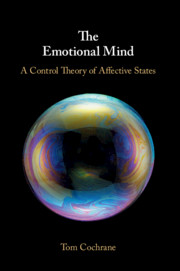
-
Select format
-
- Publisher:
- Cambridge University Press
- Publication date:
- 04 January 2019
- 10 January 2019
- ISBN:
- 9781108579056
- 9781108429672
- 9781108453059
- Dimensions:
- (228 x 152 mm)
- Weight & Pages:
- 0.47kg, 244 Pages
- Dimensions:
- (229 x 152 mm)
- Weight & Pages:
- 0.36kg, 248 Pages
- Subjects:
- Philosophy of Mind and Language, Philosophy, Psychology, Cognition
You may already have access via personal or institutional login- Subjects:
- Philosophy of Mind and Language, Philosophy, Psychology, Cognition
Book description
In this book, Tom Cochrane develops a new control theory of the emotions and related affective states. Grounded in the basic principle of negative feedback control, his original account outlines a new fundamental kind of mental content called 'valent representation'. Upon this foundation, Cochrane constructs new models for emotions, pains and pleasures, moods, expressive behaviours, evaluative reasoning, personality traits and long-term character commitments. These various states are presented as increasingly sophisticated layers of regulative control, which together underpin the architecture of the mind as a whole. Clearly structured and containing numerous diagrams and examples to illustrate the discussion, this study draws on the latest research from fields including philosophy, psychology and neuroscience, and will appeal to readers interested in the philosophy and cognitive science of emotion.
Reviews
'The book does an impressive job of solidifying diverse and broad range topics in philosophy of emotion into one manuscript.'
Dan Mills Source: Philosophy Quarterly
‘Tom Cochrane's book forges into the philosophy of emotion on a new and powerful vehicle: the idea of valent representations. His project is ambitious. Cochrane uses valent representations to give models of affect, pleasure and pain, emotion, moods, expressive behavior, social intentionality, norms, collective effervescence, inner speech, sentiments, personality, and character. Philosophers interested in any of these topics will find it a rich book, full of nuance and insight.’
Colin Klein Source: Notre Dame Philosophical Reviews
‘Cochrane's wide-ranging book makes valuable contributions to a wide variety of topics … [His] intricate, sensitive discussions of particular emotional phenomena combined with his broad survey of the contemporary literature make it valuable for anyone with an interest in the affective mind.’
Source: Ethics
Contents
Metrics
Altmetric attention score
Full text views
Full text views help Loading metrics...
Loading metrics...
* Views captured on Cambridge Core between #date#. This data will be updated every 24 hours.
Usage data cannot currently be displayed.
Accessibility standard: Unknown
Why this information is here
This section outlines the accessibility features of this content - including support for screen readers, full keyboard navigation and high-contrast display options. This may not be relevant for you.
Accessibility Information
Accessibility compliance for the PDF of this book is currently unknown and may be updated in the future.


